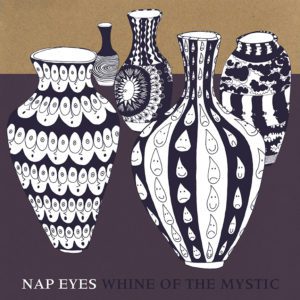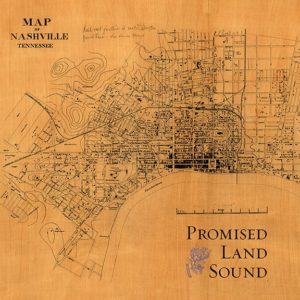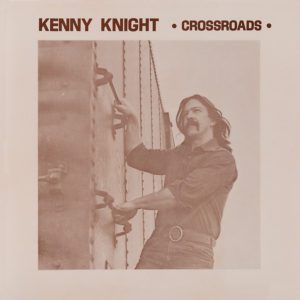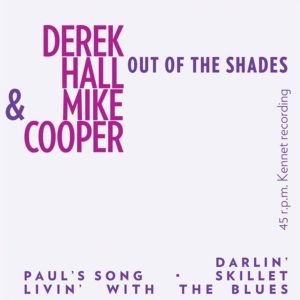The first artist-sanctioned reissue of this iconoclastic folk and experimental music legend’s classic 1970 album, Trout Steel presents a heady homebrew of lap steel and slide blues traditions, avant-jazz group improvisations, and far-out studio explorations that presaged Mike Cooper’s adventurous work for decades to come.
Highlights
- First-ever artist-sanctioned and vinyl reissue, two years in the making
- Includes 16 pp. chapbook (20 pp. CD version) with an exhaustive essay, lyrics, and never published color photos
- Available on 150g virgin vinyl as a gatefold LP, in a deluxe limited edition, as well as on gatefold CD and digital formats
- Vinyl edition includes digital download coupon
Tracklist
A1. “That’s How” 4.22
A2. “Sitting Here Watching” 3.14
A3. “Goodtimes” 3.29
A4. “I’ve Got Mine” 11.22
A5. “A Half Sunday Homage to a Whole Leonardo da Vinci (without words by Richard Brautigan)” 1.36
B1. “Don’t Talk Too Fast” 3.24
B2. “Trout Steel” 2.25
B3. “In the Mourning” 5.21
B4. “Hope You See” 4.20
B5. “Pharaoh’s March” 7.16
B6. “Weeping Rose” 3.23
Catalog Number / Formats / Release Date
PoB-013 / LP, CD / June 17, 2014
More from Mike Cooper
-

Mike Cooper: Life and Death in Paradise + Milan Live Acoustic 2018
$11.00 – $27.00Sale!
Mike Cooper & Derek Hall: Out of the Shades
$2.00 – $4.00Album Narrative
After two years of tireless work to liberate these long out-of-print masterpieces from the vaults, Paradise of Bachelors is proud to present the first artist-sanctioned reissues—and first-ever vinyl reissues—of iconoclastic English-born, Rome-based folk and experimental music legend Mike Cooper’s classic trio of early 1970s avant-folk-rock records: Trout Steel (1970), Places I Know (1971), and The Machine Gun Co. with Mike Cooper(1972). The latter two titles are presented for the very first time as the definitive double album, as Cooper originally intended them to be released.
With the oddly evocative choice of his third solo album’s title, appropriated from Richard Brautigan’s 1967 surrealist-pastoral novel Trout Fishing in America, Mike Cooper might very well have been describing his own mercurial musical practice. “Trout Steel” suggests a reflective, highly mutable, quicksilver riverine element, an apt metaphor for the lap steel runs summoned from his trademark National resophonic guitars and his restless, constantly evolving development as a singer, composer, interpreter, and improviser. Listening to Cooper’s recordings retrospectively in sequence reveals a rangy narrative of perennial reinvention from document to document through a playful approach to the deconstruction of “folk” musics and all that gross genre signifier implies and denies. Because of his staunch refusal to settle on any single sonic palette, his career has maintained a slippery, elusive, and multihued character—troutlike, eddying—full of permutations, sudden departures and transformations, and unexpected articulations and detours.
By the time the Rolling Stones invited him to join the band in the early ’60s, and he politely declined (true story; Brian Jones took the gig), he had already progressed far beyond the circumscribed bounds of their early, hip-histrionic Albionic blues. By the time he was rumored to have retired from music in the mid ’70s, disappearing from his home in Southern England into Southern Spain to become a fisherman (an amusing fiction; he suffers from seasickness), he had already moved beyond his heady homebrew of progressive, free jazz-framed songcraft into increasingly less conventionally structured frontiers of open improvisation and later, electronic composition.
The molting began in 1970 with Trout Steel, on which Cooper took a decisive step away from the folk and blues scenes in which he was well-known—he had toured with Michael Chapman and traveled in the same circles as Bert Jansch, Wizz Jones, and Davey Graham, among others—toward the New Thing jazz of Pharaoh Sanders, Sonny Sharrock, and Derek Bailey, without sacrificing any of his lyrical songwriting or forsaking his established roots in the soil of the American Southern vernacular. Producer Peter Eden (Donovan, Bill Fay, Clive Palmer) assembled a crack team of English and South African jazz and folk musicians (including Mike Osborne, Harry Miller, Geoff Hawkins, Stefan Grossman, and Heron) to record these remarkable sessions, and the results are absolutely sui generis, a compelling mix of tradition, group improvisations, and unfettered studio explorations that presaged Cooper’s adventurous work for decades to come.
Streaming
Acknowledgments
8.6: Best New Reissue. Trout Steel has the gracefully exhaled quality of a master statement. The album mostly moves in long, heaving sighs—long, free-flowing sections where Cooper plays in open tunings and clusters of instruments take their turns speaking to each other around him… Sung verse[s] alternate with extended jamming like honey running from a spoon. In a way, he’s like Van Dyke Parks; equally in love with traditions and in thrall to eccentricity, someone whose solo records build an alternate set of rules that their maker has no intention of spelling out for you.
– Jayson Greene, Pitchfork
Best reissues of 2014. The sound of a folk-rooted prodigy navigating the rapids of psychedelia. What puts his music in a league of its own is his taste for free-jazz-style instrumental play, with his own slithery slide guitar darting through abstract arrays of horns, strings, piano and percussion. Here, his singer-songwriter and experimental sides form a gnarly yin-yang marriage.
– Will Hermes, Rolling Stone
One of the pre-eminent players on the Brit folk and blues scenes. Given his organic approach to composing; his truly dazzling abilities with acoustic and slide guitars; and his predilection for just the right sidemen and arrangements, Cooper was among the most poised musicians of his generation, and Trout Steel proves the point time and again over its 11 tracks. What a ride Trout Steel is: exhilarating and adventurous each time it is played.
– Thom Jurek, Allmusic
8/10. For those of us interested in how roots music can intersect with the avant-garde, the rediscovery of guitarist Mike Cooper is a fortuitous one. These exceptional LPs reflect the freedoms and open-minded spirit of the times. Trout Steel showcases singer-songwriterly craftsmanship in the Jansch mold, occasionally dissolving into free jazz drift (the 11-minute “I’ve Got Mine” is a fidgety, minimalist precursor to Wilco’s “Less Than You Think.”)
– Uncut
4 stars. Charts Cooper’s “voyage out” with his warm folk songs venturing into Pharaoh Sanders-inspired skronk… with a grasp of the infinite worthy of the Incredible String Band.
– Matt Poacher, MOJO
4 stars. A deconstruction of folk music that simultaneously bypasses the mainstream rock of the day, sustained on a knife-edge by Cooper’s underlying guitar… It’s completely unconventional, immediately setting Cooper apart from anybody else in the early 70s folk circle. A rewarding, intriguing body of work.
– Mick Houghton, Record Collector
His 1970 album Trout Steel really steals the show as a whole.
– Laura Barton, The Guardian
For the lot of us uninitiated to Mike Cooper and his 1970 LP, Trout Steel, it’s a doozie. Earnestly reissued by Paradise of Bachelors and produced by Peter Eden (Donovan, Bill Fay), Trout Steel eloquently connects brit folk to free jazz with ease and originality. An exploratory work that makes a lasting impact on the folk genre… and puts Cooper in a world all his own. One can’t help but feel that there are many artists (both past and present) who owe a debt to Mike Cooper – whether they know it or not.
– Randy Reynolds, The Big Takeover
Cooper was forging connections between folk and experimental musics long before America got New or Weird…
– Keith Moliné of Pere Ubu, for The Wire
Essential reissues. Taken together, Trout Steel, Places I Know and The Machine Gun Co. with Mike Cooper provide a suggestive map of the post-modern eclecticism that’s blossomed in an age where the extremes of the world’s collected music can be accessed with the few taps of a button. Saxophones shriek beneath simple chords. Would-be ballads veer suddenly through psychedelic spirals. In retrospect, Cooper’s decisions feel suspiciously prophetic, like a long-range weathervane more interested in the future than present atmospheric conditions. 40 years later, Cooper’s work remains germane, even prescient.
– Grayson Currin, Independent Weekly
Trout Steel and Places I Know / The Machine Gun Co. with Mike Cooper are both excellent records, but they also tell a vital story about an important musician in modern music. These two albums capture Cooper at a pinnacle, where his newly honed songcraft and his knack for complicated sound and space met, clashed, and also combined in exciting and brilliant ways. These are reissues, but they may as well be new albums. They are as fresh as the latter and as lasting as the best of the former. By turns challenging and beautiful, earthen and ethereal.
– Matthew Fiander, PopMatters
Remarkable, groundbreaking albums that fuse folk, blues, psych, and avant-garde free jazz. Each of these records presents Cooper’s career in microcosm, shifting fluidly from country blues to psych rock to free improvisation and jazz idioms.
– Clinton Krute, BOMB
The work of a unique artist, one whose songcraft is always bolstered by relentless experimentation.
– Aquarium Drunkard
Hauntingly beautiful. His clear yet weary voice is the kind that’s made for storytelling, and Cooper sure tells some fascinating narratives across these records. Not only are his songs an evolved collection of should-be classics, but they’re also a piece of history that’s longing to be uncovered.
– Maeri Ferguson, The Horn
You only need to listen to these three albums to appreciate how far ahead of the game he was.
– Folk Radio UK

















